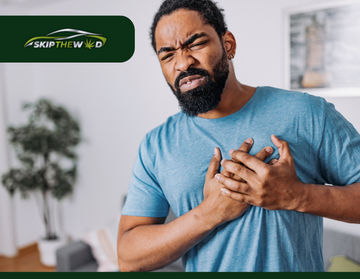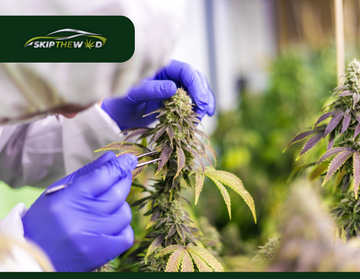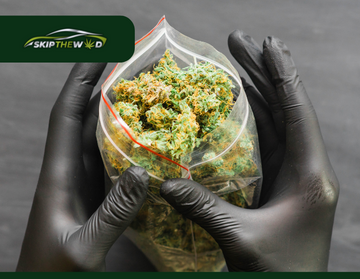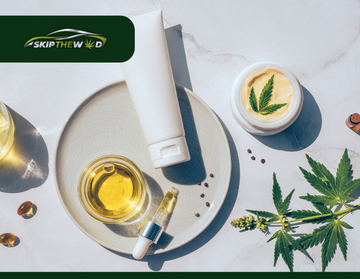As cannabis gains acceptance for medical and recreational use, its consumption has diversified. Smoking marijuana (bud) has long been the traditional way to use cannabis. But, edibles have become very popular in recent years. This change in consumption raises a question: Are edibles better for you than bud? The answer isn't simple. It depends on many factors, like health, effects, and preferences. This article will explore the key differences between edibles and smoking bud. Weighing each method's strengths and weaknesses will guide your choice. Our analysis empowers you to decide wisely and confidently.
- Understanding Cannabis Consumption Methods
Edibles
Cannabis edibles are foods or drinks infused with cannabinoids, like THC and CBD. Today, a vast range of edibles is available. They include gummies, brownies, cookies, chocolates, drinks, and savory snacks. The process of making edibles involves two steps. First, extract cannabinoids from the cannabis plant. Then, infuse them into various food ingredients.
When you eat an edible, the digestive system and liver metabolize the cannabinoids. This leads to a different experience than smoking. Edibles take longer to kick in, from 30 minutes to 2 hours. But they last longer and provide a more intense experience. Edibles appeal to those wanting a long cannabis high without frequent dosing.
Smoking Bud
Smoking bud means using a traditional method to consume cannabis. It involves inhaling the smoke from burning the plant material. This can be done using various devices such as joints, blunts, pipes, bongs, or vaporizers. Smoking allows cannabinoids to enter the bloodstream through the lungs. This leads to quick effects, usually within minutes. This immediacy is a main reason for the popularity of smoking. It appeals to those who enjoy the ritual and want to control their dose on the spot.
- Health Effects of Edibles vs. Smoking Bud
Impact on the Lungs
A key difference between edibles and smoking bud is their impact on lung health. Smoking cannabis, like any plant, introduces toxins and carcinogens into the lungs. This can lead to respiratory issues over time. Chronic smoking causes bronchitis, chronic cough, and other lung problems. Some studies say smoking cannabis is less harmful than smoking tobacco. But, there are risks, especially with long-term use.
In contrast, edibles don't involve inhalation. They avoid any harm to the lungs. This makes edibles a healthier option. They are better for people with respiratory issues. They also suit those who want to avoid smoking's risks. Also, edibles avoid secondhand smoke. So, they are a better choice in social settings.
Digestive Process
Edibles are processed by the digestive system and liver before entering the bloodstream. This process, called first-pass metabolism, converts THC into a more potent form, 11-hydroxy-THC. This metabolite makes edibles last longer and hit harder than smoking. However, effects are delayed. They usually take 30 minutes to 2 hours. It depends on metabolism, body weight, and recent food intake.
On the other hand, smoking bud leads to almost immediate effects. The cannabinoids bypass the digestive system and enter the bloodstream through the lungs. This feedback lets users better control their dosage and avoid overconsumption. For those who need quick relief, smoking can help. It works fast, which is good for managing acute pain or anxiety.
Potency and Dosage
The potency of edibles versus smoking bud is another key consideration. Edibles tend to have stronger effects. This is due to the liver converting THC, as mentioned earlier. Thus, the same THC dose from edibles can cause a stronger high than smoking. This can help those wanting stronger effects. But it needs careful dosing to avoid an overwhelming experience.
With smoking, the effects are more predictable and controllable. Users can stop after they feel high, since it kicks in right away. This makes smoking an easier way to manage dosage. It's especially true for those new to cannabis or who want a more controlled experience.
- Benefits of Edibles
Longer-Lasting Effects
One of the most significant advantages of edibles is the duration of their effects. Smoking bud usually lasts 2 to 4 hours. Edibles can last 6 to 12 hours, depending on the dose and metabolism. This long duration makes edibles appealing to medical users. They need long-lasting relief from chronic pain, anxiety, or insomnia. Also, for recreational users, edibles can provide a lasting high. It can enhance social gatherings, movie nights, and outdoor adventures.
Discreet Consumption
Edibles offer a level of discretion that smoking cannot match. Edibles don't smell like cannabis smoke. So, users can use them without attracting attention. Edibles are great for when discretion is key, like in public or with anti-cannabis folks. Edibles are portable and easy to consume. So, they are a great option for on-the-go use.
No Inhalation
Health-conscious consumers want to enjoy cannabis without smoking or vaping. Edibles are a way to do that. This is crucial for those with asthma, COPD, or other lung diseases. By avoiding inhalation, users lower their risk of respiratory issues. So, edibles may be safer for long-term cannabis use. Also, edibles avoid the throat and lung irritation some users get from smoking or vaping.
Wide Variety of Options
The variety of edibles available on the market is another appealing factor. There is an edible for almost every taste. It includes sweet treats like gummies and chocolates. It also has savory snacks like infused chips and sauces. From vegan to gluten-free, cannabis edibles now cater to diverse dietary needs. Users can easily find options that fit their food restrictions. This expands accessibility for all. Also, low-dose edibles help beginners. They start with a minimal THC level and increase it as needed.
- Drawbacks of Edibles
Delayed Onset
The delayed onset of effects is both a benefit and a drawback of edibles. The long-lasting effects can be good. But the delay in onset can lead to overconsumption, especially in inexperienced users. Some may eat more edibles before the first dose works. This creates an overwhelming sensation. This unpredictability can be a problem. It shows the need to start with a low dose and wait at least 2 hours before taking more. Also, edibles can feel more intense due to their delayed onset. This can be uncomfortable for users unprepared for the strength of the effects.
Variable Effects
Edibles affect people differently. Factors include metabolism, body weight, and tolerance. Also, homemade edibles can be inconsistent. This makes for an unpredictable experience. Even commercially produced edibles can vary in their effects. Finding the right dose challenges users. Variability demands caution, as effects fluctuate. They must experiment with different doses to find what works best for them. For some, this trial-and-error process can be frustrating. It may lead to a negative experience with edibles.
Risk of Overconsumption
Edibles are potent and take time to kick in. This raises the risk of overconsumption. Unlike smoking, where effects are quick and can be fine-tuned, edibles require patience. This is vital for inexperienced users. They may underestimate an edible's strength and eat too much. Eating too many edibles can have side effects. They include paranoia, anxiety, dizziness, and, in extreme cases, hallucinations. These experiences can be unpleasant. They may deter people from using edibles again.
- Benefits of Smoking Bud
Immediate Effects
The most significant advantage of smoking bud is the immediacy of its effects. Users can feel the effects of the cannabinoids within minutes of inhaling. This allows for better control over the experience. This quick onset is great for those wanting fast relief from pain, anxiety, or nausea. Users feel the effects almost instantly. So, they can stop once they are as intoxicated as they want. This reduces the risk of overconsumption.
More Familiar Method
Smoking is a traditional way to consume cannabis. Many users trust it to enjoy cannabis. For many, rolling a joint, packing a pipe, or using a bong is a key part of the cannabis experience. It offers a familiar, consistent ritual that edibles may lack. This predictability makes smoking a favored way to control the cannabis experience. Also, the social aspect of smoking is key to cannabis culture. Users share a joint or bong. Edibles cannot replicate this.
Better Dosage Control
With smoking, users can better control their dose than with edibles. They can more easily adjust their intake. Users can take a few puffs and stop when they feel high. The effects are felt almost immediately. This precision allows for a more tailored experience. So, smoking is preferred by those wanting to control their cannabis use. This is vital for medical users. They need to manage symptoms without getting too high.
- Drawbacks of Smoking Bud
Respiratory Issues
As mentioned, smoking cannabis means inhaling smoke. It can introduce toxins and carcinogens into the lungs. Over time, this can cause chronic bronchitis and other lung issues. Some studies say smoking cannabis is less harmful than tobacco. But risks remain, especially with long-term use. Health-conscious users may find the risks of smoking too high. So, they seek safer ways to consume it.
Shorter Duration of Effects
Smoking has immediate benefits. But, its effects wear off quickly. Smoking bud typically lasts 2 to 4 hours. This may not be enough for those seeking long-term relief from chronic pain or insomnia. This shorter duration may require users to smoke more often. This can be inconvenient and increase smoking risks. For a longer-lasting experience, edibles may be better.
Odor and Social Considerations
The distinct odor of smoking cannabis can be a significant drawback for some users. Cannabis smoke has a strong smell that lingers. It clings to clothes, hair, and the air, making it hard to be discreet. This can be a problem where discretion is important, like in shared or public spaces. Also, the stigma of smoking cannabis may deter some users. This is especially true in social settings where it is not accepted.
Conclusion
In the debate over whether edibles are better for you than bud, there is no definitive answer. Each method of consumption has pros and cons. The best choice depends on personal preferences, health, and desired effects. Edibles are discreet, long-lasting, and easy on the lungs. But, they require careful dosing and patience due to their delayed onset and potency. Smoking bud has immediate effects and better dosage control. It's a familiar experience. While offering benefits, this approach risks lung damage and lacks discretion.
Ultimately, the choice between edibles and smoking bud is a personal one. Some users may prefer the convenience of edibles. Others may value the immediacy of smoking. For those with respiratory issues, edibles may be better. They are also more discreet. Conversely, those seeking quick relief or who enjoy smoking may prefer bud.
Whatever method you choose, consume cannabis responsibly. Mind the dosage, setting, and your health. Understanding the differences between edibles and smoking bud can help consumers. They can then make choices that fit their lifestyle and health goals.









